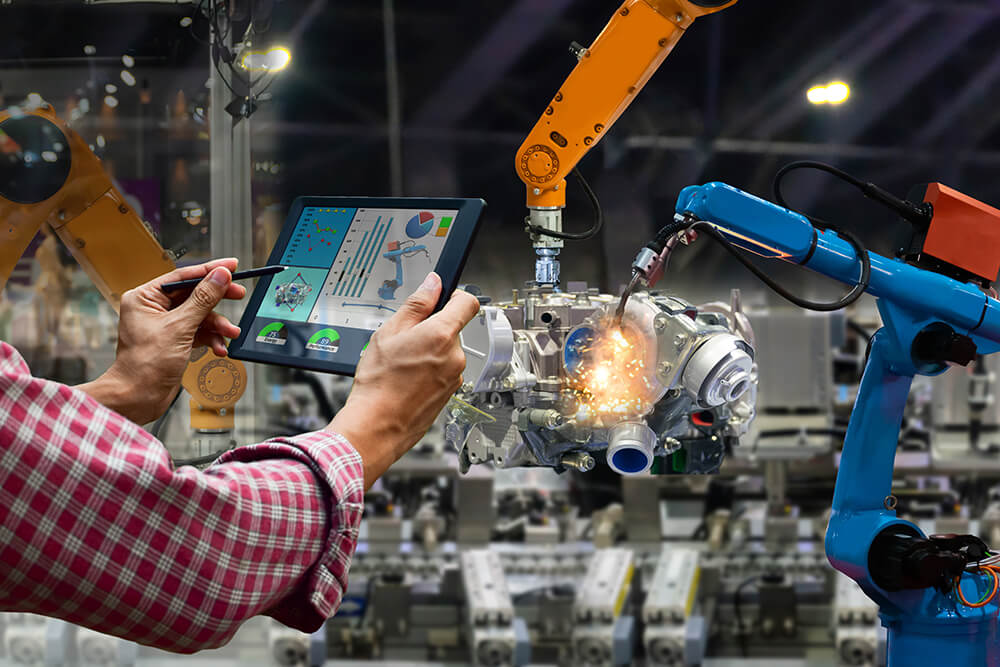4 Hard-To-Ignore Reasons Why You Should Use AI To Make More Intelligent Products
2 July 2021
Thanks to the Internet of Things (IoT), artificial intelligence (AI), and advances in sensor technology, a whole host of everyday products are getting smarter. We have smart TVs and smartwatches. We have smart running shoes – or rather, smart insoles – that gather data on your running performance. You can even get smart nappies that send an alert to your phone when your baby’s nappy needs changing.

And that’s just the tip of the iceberg. For product manufacturers, there’s no doubt we’voe reached a tipping point in the smart product trend, meaning it’s no longer possible (or wise) to ignore consumer demand for smart, AI-loaded products.
So, if you aren’t already asking yourself, “Could our products be improved with AI?”, now is the time to start. To whet your appetite, here are four huge benefits of smart products:
1. Making your customers’ lives easier (and boosting customer satisfaction in the process)
The smart product trend has particularly taken hold in our homes. Because of the IoT, basic home electronic goods and appliances can gather information on what’s going on around them and respond accordingly. For example, a smart thermostat can heat your home to the perfect temperature in time for your return from work, without you having to programme it. Technology like this makes our homes more efficient, more automated, and more responsive to our needs – helping to remove some of the annoying wrinkles and bugbears from everyday life.
This is key to the success of smart products. Rather than inserting AI for AI’s sake, it’s all about solving customers’ problems and making their lives easier. And I don’t just mean in the home. Today’s consumers expect smart solutions to a whole host of everyday tasks and activities, including changing their baby’s nappy and training for a marathon.
2. Building better products (products your customers really want)
Making your products smarter is a fantastic way to build a more in-depth understanding of your customers. This knowledge can and should feed into your product design. In my experience, building a better understanding of customers and developing more desirable products is one of the most attractive benefits for most businesses.
How does this process work? In a nutshell, by building AI capabilities into your products, you have the ability to collect masses of data on your customers’ habits and preferences: how they use your product, how often they use it, when they typically use it, and more. All this data can be used to improve product design and develop new products that better meet your customers’ needs.
3. Responding to customers’ needs more quickly
The customer journey has been forever altered (and sped up) thanks to our permanent attachment to our mobile devices. Because life is so fast-paced these days, we’re constantly making quick decisions, looking up solutions on-the-fly, and seeking split-second answers to the things we want to know. Google calls these brief “I want to know/do/buy/go/learn” flashes micro-moments, and, according to Google at least, these micro-moments are becoming a vital part of marketing. In other words, as consumers, we increasingly expect brands to respond instantly and offer us exactly what we want in the here and now.
The more information you have on your customers, the better able you are to spot and respond to these all-important micro-moments. This is where smart products come into play. Because they’re capable of gathering a wealth of data, smart products help you understand your customers’ actions, preferences, and decision making.
4. Adding new revenue streams
A less obvious benefit of smart products is that they often enable add-on, AI-driven services. And these services can add a lucrative new revenue stream for your business, particularly if you can tailor them into a subscription model. For example, let’s say you manufacture security systems and have been transitioning to smart security alarms that gather and transmit data on what’s happening in the home. Providers of similar smart security systems are now offering subscriptions to monitor the home in real-time.
Likewise, Apple has transitioned from a straight product manufacturer into a provider of music and TV streaming services (services that are supported by Apple’s iconic products). In this way, there’s a surprising amount of crossover between smart products and smart services. If you can make your own products smarter, it could pave the way for a lucrative move into services.
Everything is becoming smarter – don’t get left behind
I believe every product-based business must carefully consider this intelligent product trend. Those that don’t risk being left behind. That’s not to say you should quickly load your products with unnecessary AI, just so you can label them as “smart”. As with any new technology, it’s really important to find those ways in which AI adds the most value. This will be different for each business, and must be driven by your overarching business strategy.
Related Articles
Flying Taxis And Self-Driving Trucks Arrive In 2026: 6 Transport Trends To Watch
By now, “smart” versions exist of just about every home appliance, gadget and gizmos we can think of. However, manufacturers continue[...]
Technology in Action: My Key Takeaways on How AI and Quantum Are Accelerating Global Transformation
By now, “smart” versions exist of just about every home appliance, gadget and gizmos we can think of. However, manufacturers continue[...]
Sign up to Stay in Touch!
Bernard Marr is a world-renowned futurist, influencer and thought leader in the fields of business and technology, with a passion for using technology for the good of humanity.
He is a best-selling author of over 20 books, writes a regular column for Forbes and advises and coaches many of the world’s best-known organisations.
He has a combined following of 4 million people across his social media channels and newsletters and was ranked by LinkedIn as one of the top 5 business influencers in the world.
Bernard’s latest book is ‘Generative AI in Practice’.






Social Media